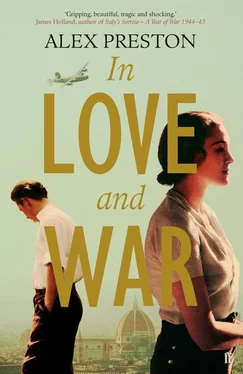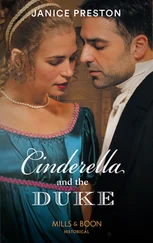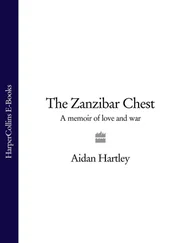Ada speaks briefly to her father in Turin. He is safe, unsure whether to use the moment to escape and join his wife in Switzerland. He thinks he will go to Lake Maggiore with Ettore Ovazza, from where it will be just a brief boat ride to the border. When she tells him that she and Esmond are expecting a baby, he bursts into tears. He is still crying when the pips sound and the call ends. ‘I love you,’ Ada manages to say, just as the line goes dead. Esmond stands close, his hands folded around her living belly.
Everything changes on the 8th of September. The closeness of August has unravelled into days of low cloud, fierce winds from the hills, sudden and violent showers. Esmond is with Bruno, Elio and Alessandro in the bar of the Excelsior, where they have taken to spending Sunday evenings. Ada is with Tosca and Antonio for dinner, but will join them later. For the first hour, Esmond teaches them English. They are all relatively fluent, but eager to improve their command of the idiom, to perfect their grammar, so that they might — as Alessandro puts it — speak with less shame to the English soldiers when they arrive. Bruno has already met a number of escaped British prisoners-of-war during his trips up into the hills. He reels off military slang — some of which even Esmond doesn’t recognise — with enormous and obvious pleasure: he speaks of ack emmas and emma gees, foot-sloggers in mufti; all soldiers are Tommies . When their beers arrive he grins ‘Here’s how!’ and ‘Down your sherbets!’
After they eat, the three Italians talk to Esmond about Communism. He has, with some reluctance, read The Communist Manifesto . He’s now reading How the Steel Was Tempered, which Elio had painstakingly, and very badly it seems to Esmond, translated into Italian during his time in prison. He finds its men the opposite of superfluous, and, for the first time, is bored by a Russian novel. The hero, Pavel, is all action, a Communist superman, almost entirely lacking an internal life. If this is the literature of the socialist utopia, he’d rather have the dissolute despotism of the nineteenth century.
Despite this, Esmond is drawn to the grandness of the socialist dream. There is such pure-souled hopefulness in the way that Alessandro, Elio and Bruno speak about politics, Bruno’s matchstick quivering as he talks, Elio’s cheeks flushing beneath his round spectacles, Alessandro’s hands twitching like nervous birds in the air as he describes his vision of an Italy where no one is judged on the basis of race, religion or gender. They look out into the dusk over the river, where waves are whipped up by the wind coming down from the hills. They feel like serious young men, at the centre of things.
‘You must be engaged,’ Alessandro says, nodding his spring-curled hair. ‘To act in good faith you must feel the cause deep in your bones, the justness of our mission must beat with your heart.’ He quotes a letter of Marx several times, conducting the air with a finger as he speaks. ‘If we work for all mankind,’ he says, ‘our happiness will belong to millions, our deeds will live on quietly but perpetually at work, and over our ashes will be shed the hot tears of noble people.’
While he is speaking, there is a commotion behind the reception desk, loud shouts from the kitchens. Alessandro stops, midstream, and beckons to a waiter.
‘Comrade,’ he says, eliciting a look that mixes scorn and confusion, ‘will you find out what gives?’
After a few minutes, the waiter comes back with a bottle of grappa and four glasses. ‘May I sit with you?’ he asks and pulls up a chair beside Esmond. He fills the four glasses and raises his own. ‘Badoglio has just signed an Armistice with the Allies. An American radio station announced it earlier. The war is officially over for Italy. Saluti .’ They knock back their drinks.
‘But what about the Germans?’ Esmond asks. ‘They’re still here, in Italy I mean, so many of them.’
A communal shrug. ‘Have a gargle of this,’ Bruno says, filling his glass. ‘And stop worrying.’
When Esmond and Ada get back to L’Ombrellino, it is raining so hard that they can’t sleep, and so lie in each other’s arms watching lightning like suddenly recalled memories illuminating the sky. Just before dawn the storm passes, and the air around them is washed silent and clean. A feeling of extraordinary peace in the house. He doesn’t even think about winter. The Allies would be there before the end of the month, bringing with them oil and butter and real life. He realises he should be worrying instead about what he’ll do to earn his living, how to feed his family — what an idea! — now the war is drawing to a close, but he can’t muster any more than a brief flutter of anxiety. Time would catch up with him eventually; until then, everything is arrested and provisional, as if preserved in amber. He drifts to sleep thinking of Rudyard being welcomed by grinning Italian soldiers as he steps off the boat at Reggio Calabria, of seeing his brother for the first time in five years.
Sleep manages somehow to conflate Rudyard and Anna and the joy in his dream celebrates both his brother’s unlikely passage through Italy and his sister’s return from her longer, darker journey. He wakes just after nine with a shriven, bare feeling, longing to return to the unearthly brightness of his dream.
He hears them several minutes before he sees them. He is having lunch at the Giubbe Rosse. The bar has taken delivery of a crate of tomatoes from a group of friendly contadini who, in payment, are getting riotously drunk in a room at the back. Because of the noise inside, he is sitting at a round, glass-topped table in the piazza and eating the tomatoes on bread made with chestnut flour. It is not good, but with a glass of Chianti it is edible. It has turned cold and he is wearing George Keppel’s double-breasted ulster buttoned to his throat.
He is reading Lermontov’s A Hero of Our Time, which, barely a third of the way through, is having a powerful effect upon him. He realises the superfluous man is a Slavic counterpart to the Italian notion of sprezzatura , a kind of studied carelessness affected by all the young men who surround the Professor. Philip had it, and Mosley; Bruno, Elio and Alessandro have it in spades. Ada, too, he thinks with a wistful smile. He decides he needs to affect a little more sprezzatura himself. Played right it is almost indistinguishable from heroism.
He looks up from his book with bother. His knife is rattling on the glass surface of the table. He picks it up, puts it on his plate and continues to read. Now the plate begins to move on the table, taking little hops and jumps until it smashes on the ground. A low rumbling that grows gradually louder until he feels the cobbles tremble beneath his feet.
‘Gianni, quickly,’ he shouts. The waiter comes to stand beside Esmond, who has risen breathlessly from his seat. The rumbling grows louder until all of the contadini are out in the square, throwing their caps in the air and cheering.
‘ Gli Americani! ’
‘ Gli Inglesi! ’
It takes a moment for Esmond to adjust once the first tank pulls through the triumphal arch and into the square. The smile stays on his face, the happiness flips in his stomach. The contadini stand in idiotic silence, their caps like shot birds at their feet.
‘ Porca Madonna, ’ Gianni whispers. Esmond’s smile finally gives way. There are now two tanks in the square, now three: a procession of them making their way over the cobbles and into the via Calimala. They come in a grey stream, thundering past the café. Some of the tables fall over at the vibration, their glass tops shattering. Each of the tanks bears on its side an unmistakable Iron Cross. White flags flutter from the Panzers’ cannons, but their turrets swivel, taking in the square until one points at the group standing amidst the tables and broken glass. A contadino with ruddy cheeks and the wounded blue eyes of a husky flinches. The tanks — Esmond counts sixteen — are followed by armoured personnel carriers, two enormous Hummel guns, and finally a fleet of ten covered Kübelwagens in which sit officers in the grey uniforms of the SD. Their jackets match the sky, Esmond thinks, as one of the cars stops in front of the group.
Читать дальше












